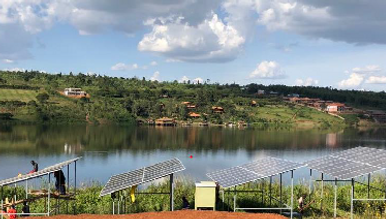Project
Overview
COUNTRY: Rwanda
LOCATION: Nile Akagera Upper Catchment region, East and Southern Province
INDUSTRY FOCUS: Agriculture, Renewable Energy, Irrigation Systems
The EcoSmart Agri-Food Value-Chains Development Project is a transformative initiative led by Greentech Group, aiming to revolutionize agriculture in Rwanda's NAKU region through large-scale renewable energy applications. The project integrates solar-powered irrigation systems with post-harvesting and processing facilities, targeting 50,000 hectares of agricultural land to support smallholder farmers in achieving sustainable agricultural production.

Problem Statement
The agricultural sector in Rwanda faces critical challenges stemming from climate change impacts. The current situation is characterized by erratic rainfall patterns and prolonged droughts, severely affecting crop yields and food security. The absence of adequate irrigation infrastructure exposes farmers to climate vulnerabilities, while limited access to reliable and affordable post-harvest processing facilities significantly constrains farmers' income potential and market access. These interconnected challenges create a pressing need for a comprehensive solution to ensure agricultural sustainability and food security in the region.
Solution
The project implements an integrated solar-powered agricultural system comprising multiple strategic components. The solution centers on deploying solar water pumping stations, water reservoirs, and irrigation networks, complemented by e-tractors and modern storage and processing facilities. This comprehensive approach creates a sustainable pay-service delivery model that supports the entire agri-food value chain for consolidated smallholder farmlands, ensuring both environmental sustainability and economic viability.
Project Stages
The initiative is currently focusing on the NAKU Catchment area in its first phase. The implementation process encompasses comprehensive infrastructure development, equipment installation, and the establishment of robust farmer support systems. With an innovative scalable design, the project envisions expansion from the initial 50,000 hectares to over 500,000 hectares countrywide, with potential for further replication across Africa.
Impact
The project targets 250,000 smallholder farmers in its first phase, with comprehensive expected outcomes including advanced agribusiness development, enhanced crop yields, and improved rural livelihoods. The initiative aims to boost agricultural exports while maintaining strong environmental sustainability principles. Through its integrated approach, the project will significantly enhance climate resilience and create economic empowerment opportunities within farming communities.
Stakeholders
Key Partners:
-
Greentech Group Consortium
-
Government agencies
-
NGOs
-
Private sector partners
-
Local farming communities
-
Financial institutions
-
Technical experts in renewable energy, agriculture, and water resources
Funding
Total Investment Required: USD 600 million (for 50,000 hectares)
Funding Sources:
-
Equity investments
-
Impact investments
-
Carbon Credits (Article 6 of Paris agreement)
-
Green bonds
Cost Structure:
-
Capital Expenditures:
-
Infrastructure development (irrigation systems, storage facilities)
-
Land acquisition
-
Equipment and machinery
-
-
Operational & Maintenance:
-
Labor costs
-
Agricultural inputs
-
Energy costs
-
Maintenance and repairs
-
Revenue Streams:
-
Agricultural Production:
-
High-value crops sales
-
Value-added processing
-
Market diversification (domestic and international)
-
-
Water Services:
-
Water user charges
-
Water leasing services
-
Additional Components:
-
Farmer training programs
-
Market linkage services
-
Extension support services
.png)



